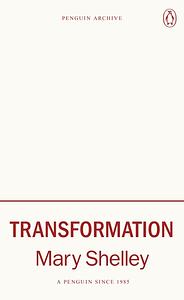Take a photo of a barcode or cover
dark
funny
lighthearted
mysterious
fast-paced
Plot or Character Driven:
Plot
Strong character development:
Yes
Loveable characters:
Yes
Diverse cast of characters:
No
Flaws of characters a main focus:
No
This really reminded me of Frankenstein! It has that childhood backstory and tragedy, leading up to the present. The protagonist witnesses a shipwreck in a storm, and a mysterious creature floats to shore, who persuades him to swap bodies for three days. As a reward he would get a treasure chest. Of course after three days the creature doesn't come back, and he goes to find it. He discovers that he creature, in his body, is about to marry his girlfriend / fiancé, so he attacks and kills it. He gets his body back, marries his love and lives happily ever after - but is still traumatized by what happened.
A lot happens in this very short story, but it works pretty well! Definitely recommend this to people who love Frankenstein.
A lot happens in this very short story, but it works pretty well! Definitely recommend this to people who love Frankenstein.
dark
mysterious
tense
medium-paced
Plot or Character Driven:
Plot
Strong character development:
Yes
Loveable characters:
No
Diverse cast of characters:
No
Flaws of characters a main focus:
Yes
This is a good little book: just three stories collected together, but they're all interesting.
The first two are in the Gothic tradition: the title story, Transformation is a story of the squandering of youth's potential, of decadence and selfishness. A morality tale, but not overbearingly so. The scene of Guido on the desolate shore, meeting with the dwarf cast up from the stormy sea is very effective.
The second story, The Mortal Immortal tells of the growing loneliness and despair felt by Winzy (who considers himself to be a young immortal, being only 323 years old) as all that he knows and loves passes away. This is a take on the Sorcerer's Apprentice motif and the most tragic in tone of the three stories.
The last story, The Evil Eye, is not Gothic, but would, I'm sure, have been received as rather exotic at the time of its original publication (1829). Set in Albania and Greece, this is a tale of sibling rivalry, vengeance and treachery, piracy, banditry and abduction. The unlikely coincidences are forgiveable in such an engagingly-told story.
I liked the way Shelley switched the focus on characters as you're not at first sure where your sympathies should lie. I think it's good when authors skew your expectations and don't immediately give you everything on a plate.
The first two are in the Gothic tradition: the title story, Transformation is a story of the squandering of youth's potential, of decadence and selfishness. A morality tale, but not overbearingly so. The scene of Guido on the desolate shore, meeting with the dwarf cast up from the stormy sea is very effective.
The second story, The Mortal Immortal tells of the growing loneliness and despair felt by Winzy (who considers himself to be a young immortal, being only 323 years old) as all that he knows and loves passes away. This is a take on the Sorcerer's Apprentice motif and the most tragic in tone of the three stories.
The last story, The Evil Eye, is not Gothic, but would, I'm sure, have been received as rather exotic at the time of its original publication (1829). Set in Albania and Greece, this is a tale of sibling rivalry, vengeance and treachery, piracy, banditry and abduction. The unlikely coincidences are forgiveable in such an engagingly-told story.
I liked the way Shelley switched the focus on characters as you're not at first sure where your sympathies should lie. I think it's good when authors skew your expectations and don't immediately give you everything on a plate.
This is 3 stories in 1
Transformation: I loved this! It felt a lot like Frankenstein which I love. 5 stars for this story
The Mortal Immortal: This was a really interesting take on humanity, relationships and love. It reminded me a bit of Dorian Gray. 4 stars for this one.
The Evil Eye: I’m not going to lie I had no idea what was happening in this story! There were far too many made up words that made it really hard to follow. 2 stars for this.
Transformation: I loved this! It felt a lot like Frankenstein which I love. 5 stars for this story
The Mortal Immortal: This was a really interesting take on humanity, relationships and love. It reminded me a bit of Dorian Gray. 4 stars for this one.
The Evil Eye: I’m not going to lie I had no idea what was happening in this story! There were far too many made up words that made it really hard to follow. 2 stars for this.
This collection brings together three little-known short stories by Mary Shelley, the revered author of Frankenstein. Each is a fantastic example of her writing prowess, and the ways in which she pioneered the science-fiction and horror genres.
The title story, Transformation, draws on classic fables and the work of Shakespeare to create a brilliantly timeless and evocative moral tale. In it, we follow a man, spurned by his great love and exiled from his homeland, who makes a deal with a strange, demonic creature in his pursuit of vengeance. Thematically, it explores the idea that true ugliness comes from the inside, the danger of succumbing to our own greed and entitlement, and the notion that the best lessons in life are often hard won. It also has all the hallmarks of the best gothic fiction, including rich settings, thick atmosphere, and sumptuous prose. (‘Evening was at hand when, seaward, arose, as if on the waving of a wizard’s wand, a murky web of clouds, blotting the late azure sky and darkening and disturbing the till now placid deep […] The waves raised their white crests; the thunder first muttered, then roared from across the waste of waters, which took a deep purple dye, flecked with foam.’) – 5 stars.
The Mortal Immortal is a melancholic and fascinating story that draws on Shelley’s own real-life experience of outliving those she loved, exploring the dichotomy of simultaneously hating life and fearing death. Her protagonist, an alchemist’s assistant, consumes a potion he hopes will cure him of the pain of unrequited love. Instead, it grants him immortality, dooming him to a life of loneliness as he watches those dear to him fade away. As with Frankenstein, there’s a thread about the danger of pursuing science beyond our control (‘… the more I live, the more I dread death, even while I abhor life. Such an enigma is man – born to perish – when he wars, as I do, against the established laws of nature.’) It’s another gothic gem, made all the more poignant given the context of Shelley’s own tragic life. – 4.5 stars.
The final story, The Evil Eye, has a subtle supernatural edge, but it’s considerably less gothic. A tale of piracy, betrayal, revenge, and family, it has a grand, epic scope despite its modest length. The adventurous nature of the plot means there are some exciting moments, alongside some typically gorgeous prose, but my love for the dark, gothic, and thought-provoking nature of the previous stories left me feeling underwhelmed by this one. – 2.5 stars.
In an ideal world, the third story would have been omitted in favour of something more in keeping with the tone and quality of the others, but altogether, this still makes for a solid example of Shelley’s skill, and why her catalogue of work beyond Frankenstein is well worth exploring.
The title story, Transformation, draws on classic fables and the work of Shakespeare to create a brilliantly timeless and evocative moral tale. In it, we follow a man, spurned by his great love and exiled from his homeland, who makes a deal with a strange, demonic creature in his pursuit of vengeance. Thematically, it explores the idea that true ugliness comes from the inside, the danger of succumbing to our own greed and entitlement, and the notion that the best lessons in life are often hard won. It also has all the hallmarks of the best gothic fiction, including rich settings, thick atmosphere, and sumptuous prose. (‘Evening was at hand when, seaward, arose, as if on the waving of a wizard’s wand, a murky web of clouds, blotting the late azure sky and darkening and disturbing the till now placid deep […] The waves raised their white crests; the thunder first muttered, then roared from across the waste of waters, which took a deep purple dye, flecked with foam.’) – 5 stars.
The Mortal Immortal is a melancholic and fascinating story that draws on Shelley’s own real-life experience of outliving those she loved, exploring the dichotomy of simultaneously hating life and fearing death. Her protagonist, an alchemist’s assistant, consumes a potion he hopes will cure him of the pain of unrequited love. Instead, it grants him immortality, dooming him to a life of loneliness as he watches those dear to him fade away. As with Frankenstein, there’s a thread about the danger of pursuing science beyond our control (‘… the more I live, the more I dread death, even while I abhor life. Such an enigma is man – born to perish – when he wars, as I do, against the established laws of nature.’) It’s another gothic gem, made all the more poignant given the context of Shelley’s own tragic life. – 4.5 stars.
The final story, The Evil Eye, has a subtle supernatural edge, but it’s considerably less gothic. A tale of piracy, betrayal, revenge, and family, it has a grand, epic scope despite its modest length. The adventurous nature of the plot means there are some exciting moments, alongside some typically gorgeous prose, but my love for the dark, gothic, and thought-provoking nature of the previous stories left me feeling underwhelmed by this one. – 2.5 stars.
In an ideal world, the third story would have been omitted in favour of something more in keeping with the tone and quality of the others, but altogether, this still makes for a solid example of Shelley’s skill, and why her catalogue of work beyond Frankenstein is well worth exploring.
I spotted the slim Alma 101 edition of Mary Shelley's Transformation and Other Stories in the library. I was unaware of these tales beforehand, and thus wrestled the tiny book out from the very packed-full shelf accordingly. I adore Frankenstein, and have been so keen to pick up more of Shelley's work for years, but rarely find it.
The three stories collected here are great. They are science-fiction-esque; normally, this is a genre which I do not enjoy, but Shelley does it so well. Her tales are highly inventive and clever, and were nowhere near as creepy as I was expecting. Engrossing, beautifully written, and so well formed, Transformation would be an excellent choice for anyone to pick up.
The three stories collected here are great. They are science-fiction-esque; normally, this is a genre which I do not enjoy, but Shelley does it so well. Her tales are highly inventive and clever, and were nowhere near as creepy as I was expecting. Engrossing, beautifully written, and so well formed, Transformation would be an excellent choice for anyone to pick up.
Mary Shelley is best known for "Frankenstein" and, to a lesser extent, her end-of-days novel "The Last Man". However, apart from a number of other novels, she also wrote several short stories, often with a supernatural or fantastic theme. Three of these are included in this attractive paperback edition published by Hesperus Classics. The title piece - "Transformation" - describes the narrator's Faustian pact with a devilish dwarf, and is rich in Gothic tropes. "The Mortal Immortal" features a hapless protagonist who drinks an elixir of life and eventually discovers that immortality is more of a bane than a blessing. "The Evil Eye" is a tale of warring tribes and family feuds set in the Balkans. Despite its title, its subject is not overtly supernatural but, in its exoticism and unexpected plot twists it recalls respectively the "Oriental Gothic" and the then budding genre of "sensation literature". All three stories are finely crafted and reveal an active imagination at work. "Frankenstein" was certainly no one-off.
dark
emotional
slow-paced
Strong character development:
Complicated
Loveable characters:
No
Diverse cast of characters:
No
Flaws of characters a main focus:
Yes






